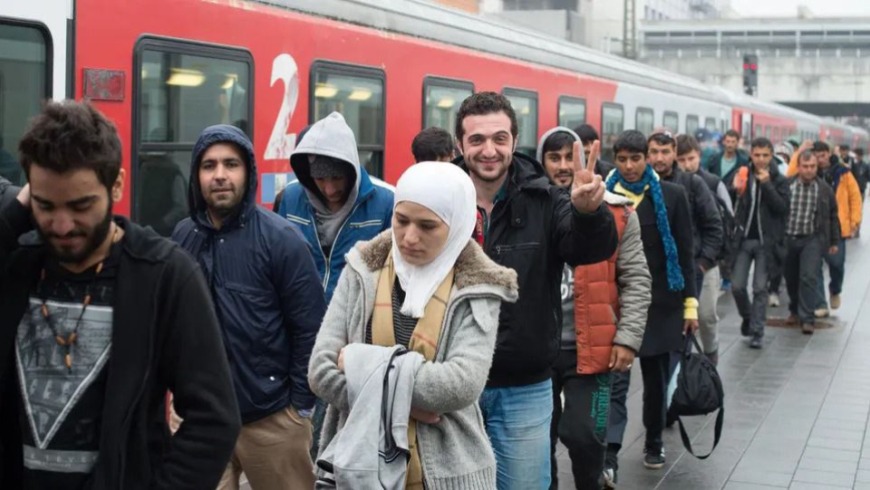Issa al-Hassan’s parents, originally from Deir-ez-Zor governorate and now residing in a poor neighbourhood of Damascus, were in disbelief upon learning that their son was the suspect in a knife attack that claimed three lives in Solingen, a city in the western German state of North Rhine-Westphalia.
The attack occurred on the evening of the 23rd of August during a festival in Solingen. According to German police, the 26-year-old Syrian refugee allegedly stabbed bystanders indiscriminately, resulting in the deaths of two men and one woman, and injuring eight others, four of whom remain in critical condition.
A report by the German newspaper Der Spiegel detailed the struggles of the suspect’s family, who have had to flee multiple times in recent years due to the ongoing war. They now live in one of the poorest areas of Damascus, where four family members share a single room. The father, a retired soldier, receives a small pension, while the mother supplements their income by selling bread. The family’s two other sons, who work in Turkey, occasionally send money to help make ends meet.
“He wasn’t religious”
“Issa was always a cheerful and social person; he wasn’t particularly religious and had no involvement with extremist groups,” says his sister Fatima. “When he was here, we would ask him to pray, but he rarely did—only once a day. He also avoided fasting, saying, ‘I can’t fast the whole month of Ramadan; I feel weak and dizzy.'”
The family sent him out of Syria to escape the violence inflicted by the Islamic State. He initially lived in Turkey, where two of his brothers worked. However, when the threat of deportation arose—along with the looming prospect of being conscripted into the Syrian military—he decided to move to Germany.
According to his sister, “Issa always told us he was fine and happy in Germany. The plan was for him to settle down, get married, and secure his future. We believed Germany was a safe, distant place where no one was being deported.”
Fatima recalls that Issa lived in Turkey for two years before traveling to Germany, after the family had fled multiple times from ISIS. “Our father was worried for him because of the masked men—ISIS was forcibly recruiting young people, and my brother was still a teenager at the time,” she said.
Implications of Solingen’s attack on the future of asylum in Germany
The political landscape and legal framework in Germany are undergoing significant changes concerning immigration and asylum in the wake of the knife attack in Solingen. The incident has intensified debates about tightening asylum procedures and expediting deportations, prompting the government to take steps to reinforce these policies. These developments are unfolding amid a heated political race just days before crucial parliamentary elections in the eastern German states of Thuringia and Saxony.
The German government is facing mounting pressure to implement stricter immigration and asylum policies and to take harsher measures against dangerous and convicted refugees. This comes after a series of crimes committed by refugee suspects, the most recent being the stabbing attack in Solingen, where a Syrian refugee claimed by the Islamic State killed three people.
Following the stabbing death of a policeman by an Afghan refugee in early June in Mannheim, in the southwestern state of Baden-Württemberg, the federal government reached an agreement with state governments. They decided that “dangerous criminals and terrorist sympathizers should be deported to Afghanistan and Syria again in the future.” The federal states welcomed Federal Chancellor Olaf Scholz’s announcement on this matter.
Government carries out first deportation
On Friday, the German government announced the deportation of 28 Afghan refugees to their home country, marking the first deportation to Afghanistan since the Taliban seized power in August 2021. Government spokesman Steffen Hebestreit stated that “these are Afghan citizens, all of whom have been convicted of crimes, are not entitled to remain in Germany, and have been issued deportation orders.”
Government agrees to tighten security and asylum policy
Seeking tougher measures on security and asylum policy, the ruling coalition parties on Thursday approved a new package of initiatives. These include tightening gun laws, removing subsidies for certain asylum seekers, expanding the powers of security authorities, and combating extremism.
Interior Minister Nancy Faeser announced that the coalition had agreed to cut social assistance for some asylum seekers. “This applies to asylum seekers for whom another European country is responsible under the Dublin Regulation and has agreed to readmit,” she said, referring to individuals who have been fingerprinted or applied for asylum in another European country before arriving in Germany.
The measures also introduce an absolute ban on the use of knives at public festivals, sporting events, trade fairs, markets, or similar public gatherings. Additionally, federal states will be allowed to impose knife bans in areas where crime is prevalent, such as train stations.
According to a government document outlining the specifics of these measures, “those who travel to their country of origin without compelling reasons will lose their right to protection in Germany, with the exception of Ukrainian refugees.” The package of measures is set to be voted on by both the upper and lower chambers of the German parliament.
This article was translated and edited by The Syrian Observer. The Syrian Observer has not verified the content of this story. Responsibility for the information and views set out in this article lies entirely with the author.


